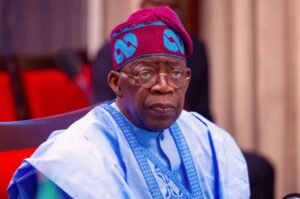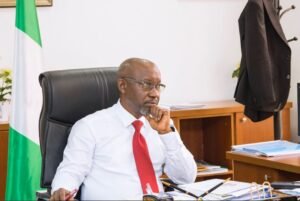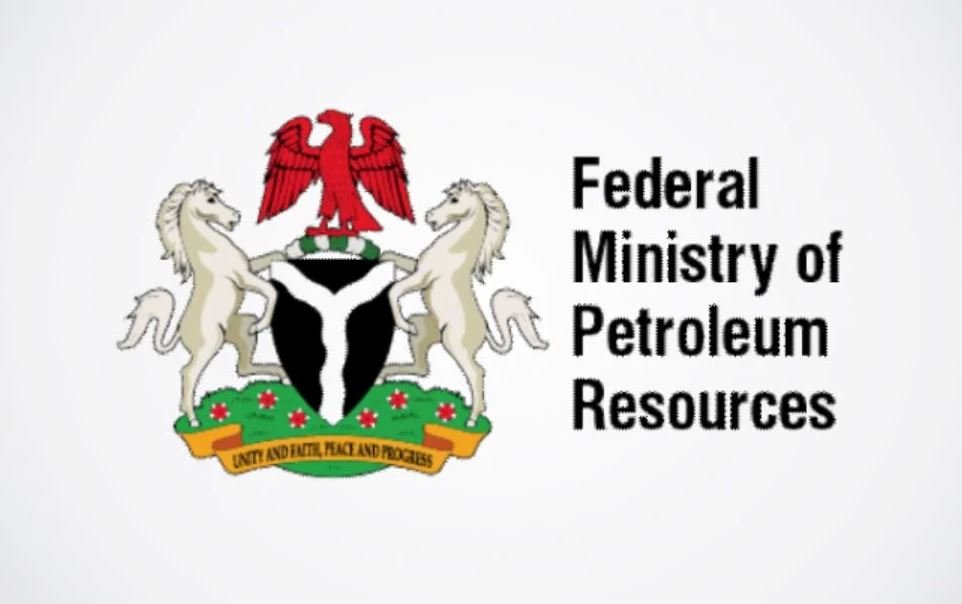The Ministry of Petroleum Resources in Nigeria is the government agency that oversees the country’s oil and gas industry.
It formulates and implements policies that regulate the exploration, production, refining, and distribution of petroleum products.
The responsibility of this ministry includes granting licenses, ensuring compliance with environmental regulations, and promoting sustainable development within the sector. The ministry plays a big part in Nigeria’s economy, as oil and gas revenues are a major source of government income.
READ ALSO: Complete List Of Ministers Of Sport Development In Nigeria
List Of Ministers Of State (Gas) Petroleum Resources In Nigeria
Name | Term Start | Term End | Party |
|---|---|---|---|
Hon. Ekperipe Ekpo | 2023 | Present | APC |
Departments In The Ministry Of Petroleum Resources In Nigeria
Here are all the departments In the Ministry of Petroleum Resources In Nigeria:
- Department of Finance and Accounts
- Department of General Services
- Department of Gas
- Department of Human Resources Management
- Department of Internal Audit
- Department of Oil Services
- Department of Planning
- Department of Press and Public Relations
- Department of Procurement
- Department of Research and Statistics
- Department of Reforms Co-ordination
- Department of Special Duties
READ ALSO: List Of Ministers Of Nigeria Delta Affairs (2008-Date)
Parastatals Under The Ministry Of Petroleum Resources In Nigeria
- Petroleum Technology Development Fund (PTDF)
- Nigerian Content Development Monitoring Board (NCDMB)
- Nigeria Nuclear Regulatory Authority (NNRA)
- Petroleum Training Institute (PTI)
- Nigerian Mid- and Downstream Petroleum Regulatory Authority (NMDPRA)
- Nigerian Upstream Petroleum Regulatory Commission (NUPRC)
Who Is The New Minister Of Petroleum Resources In Nigeria?

The current Minister of Petroleum Resources in Nigeria is President Bola Ahmed Tinubu. Since taking office as the 16th President of Nigeria on May 29, 2023, Tinubu has been overseeing the petroleum sector himself, which is a key part of Nigeria’s economy.
This decision to also hold the petroleum portfolio is not new in Nigeria’s history, as previous presidents have also served in this role due to the importance of the oil industry to the country’s finances and development.
As the Minister of Petroleum Resources, Tinubu is responsible for managing Nigeria’s vast oil and gas resources. Nigeria is one of the largest oil-producing countries in Africa, and oil exports make up a significant portion of the government’s revenue.
The Petroleum Ministry oversees policies related to exploration, production, and regulation of the oil and gas sectors. When Tinubu took office, one of his first big moves was to end fuel subsidies.
This decision was a bold step aimed at economic reform, as the fuel subsidies had long been a financial burden on Nigeria’s economy.
By removing these subsidies, the government could redirect resources to other pressing areas like infrastructure, education, and healthcare.
However, this change led to an increase in fuel prices, which caused public outcry and calls for protests from various labor unions.
Under Tinubu’s leadership, the focus has shifted towards boosting production and improving efficiency in the oil and gas sectors.
Nigeria’s oil output has been facing challenges due to issues like oil theft, pipeline vandalism, and inefficiencies in production. These are some of the problems that the ministry is working to address.
Another key area Tinubu’s administration is tackling is the restructuring of the Nigerian National Petroleum Corporation (NNPC).
The NNPC was recently transformed into a limited liability company, now called NNPC Limited, to make it more commercially focused and less dependent on government funding.
This restructuring is intended to make NNPC Limited more competitive in the global oil market and attract private-sector investments.
As President and Minister of Petroleum Resources, Tinubu has also taken steps to clean up the management of Nigeria’s oil wealth. He has introduced reforms to make the sector more transparent and accountable.
By focusing on economic reforms and tackling inefficiencies, Tinubu hopes to improve Nigeria’s oil industry and strengthen the country’s position as a major player in the global energy market.
READ ALSO: List Of Ministers Of Marine And Blue Economy In Nigeria
Who Is The New Minister Of State For (GAS) Petroleum Resources In Nigeria?

The new Minister of State for Petroleum Resources (Gas) in Nigeria is Ekperikpe Ekpo. He took on this role in August 2023 as part of President Bola Tinubu’s administration.
Ekpo is responsible for overseeing Nigeria’s gas industry and its strategic development. One of his main goals is to use the country’s natural gas resources to boost the economy and support sustainable energy solutions.
He is working on key initiatives like the Nigerian Gas Expansion Program (NGEP), which focuses on increasing gas infrastructure and reducing gas flaring to improve Nigeria’s environmental and energy landscape.
Ekperikpe Ekpo had a long career in Nigerian politics. From 2007 to 2011, he served as a member of the House of Representatives, representing the Abak/Etim Ekpo/Ika federal constituency.
During his time in the House, he was active in promoting public welfare and infrastructure development. He also worked on different committees, including Industry, Customs, National Security, and Niger Delta Affairs.
Ekpo’s political career began in local government. In 2003, he was appointed as the Caretaker Chairman of the Ika Local Government Council and later elected to lead the council in 2004.
One of his notable achievements at the time was helping to connect Ika to the national electricity grid. However, In his current role as Minister of State for Petroleum Resources (Gas), Ekpo is driving forward important projects in Nigeria’s gas industry.
He played a major part in resolving the Gas Sales Purchase Agreement for the Brass Methanol Project, which brought in $3 billion in investments.
He also oversaw the development of key gas infrastructure projects, such as the Kwale Gas Gathering Hub and LPG (liquefied petroleum gas) transportation infrastructure.
Ekpo is dedicated to improving Nigeria’s gas industry by attracting more investments and making the sector more environmentally friendly.

